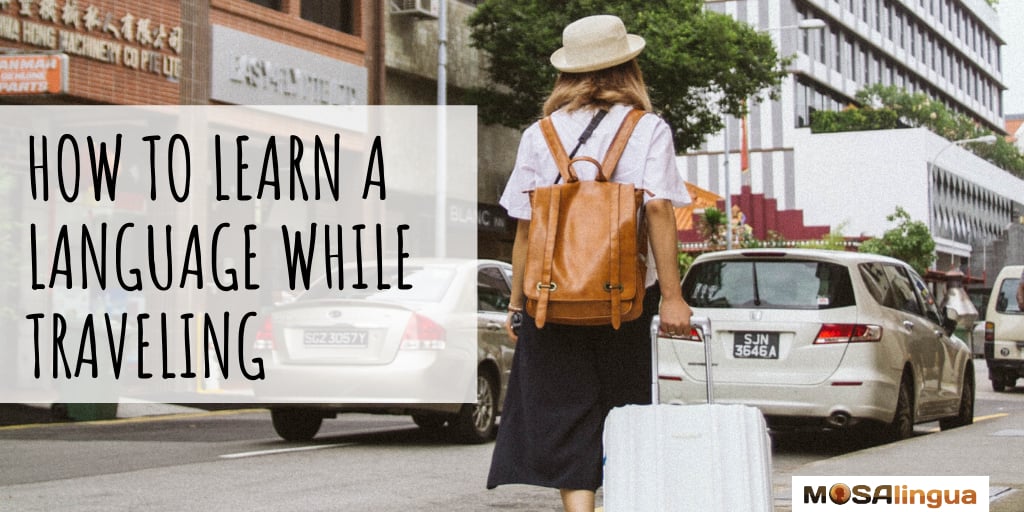Experts will tell you that learning a foreign language is easiest to do when you’re fully immersed in it, such as while traveling. However, finding yourself traveling in a foreign country before feeling completely comfortable in their language can feel daunting. Lucky for you, this is not an uncommon occurrence.
Think about your own experience – if you meet someone clearly struggling with your native language, how do you react? It is exciting to meet someone learning your language for the first time! As a local, you may feel excited to show off interesting attractions and teach tourists the language they need to get around in your country.
In return, it is likely that you will undergo a similar experience throughout your own travels – we hope you do! Just as we hope you take a leap and try to immerse yourself in the foreign language of your choice.

Tips on How to Travel and Learn a Language at The Same Time
Below, you’ll find a few tips we have about how to learn learn a foreign language while traveling. Travelers can further prepare themselves for their amazing travel experience by learning some habits that will help you lay the foundation for learning a new language.
1. Force yourself to learn through complete immersion
Most people will tell you that full immersion is the best way to learn a foreign language while traveling. And with good reason. If you are completely unable to use your native language, you will have no choice but to adapt.
Getting by while traveling without communicating is nearly impossible. From reading street signs to asking for directions, ordering in a restaurant or making purchases from local stores, you will have to communicate at some point during your trip in order to have a comfortable stay.
How will you get around while traveling? Where will you sleep? For example, for a recent trip, I used an RV rental to get around. Without being able and willing to communicate with locals, I wouldn’t have been able to get around. You’ll probably have to rent a vehicle, hop in a taxi, or reserve a hotel room during your stay. The more you take these opportunities to use the native language, the more comfortable you will be with using the language in casual conversation.
Forget your native language for a while and immerse yourself in the language of the country you’re visiting. You just might surprise yourself with how much you already know, and how much you’ll learn along the way!
Linguists recommend complete immersion in a foreign language because there is truly no better replacement for the experience. You may not know your full potential when it comes to learning and speaking a foreign language until you are forced to do it. This sort of experience switches the process from attempting to learn a foreign language to simply trying to get by.
2. Imitate attitudes and tones you hear
The advantage of being around native speakers of the language you are learning is that you will be able to mimic their attitudes and tones. It’s one thing to learn a written language, but another thing to see and hear people speaking it around you.
It will be easy for you to notice patterns in the way people are speaking to you and recognize the cadence with which certain phrases are said. Think of phrases in your native language; is there a certain way people tend to pronounce them? Would it be odd if someone greeted you with a certain tone?
Some of these things are passed on naturally and are difficult to teach, because native speakers may not even know how to explain them. Luckily, you will likely find yourself picking up on these cadences subconsciously during your stay.
The value of learning a language in this way is that it gives the listener both a conscious and subconscious education of the language.
How to do it
To learn a language while traveling, keep an app or language dictionary handy to look up new words and phrases. Once you learn a new word, be sure to listen carefully to how native speakers sound when using the word. Then, you can try to imitate it.
You will never be in a better situation to gauge the reaction of those around you and get instant feedback about the way you are speaking than when you are totally immersed. How native speakers react to your tone and vocabulary usage will tell you whether or not you are using it correctly.
Feel free to directly ask locals for help with tone and pronunciation. Learn to ask if you are saying something correctly and flourish from the wealth of firsthand feedback you receive.
3. Release your inhibitions
You may feel an initial embarrassment when speaking a new language to native speakers. Without allowing yourself to feel comfortable, you will never speak the language to the fullest extent or experience immersion.
Your experience speaking this new language to strangers will not be perfect. You won’t say everything perfectly, especially at the beginning of the trip. If you focus too much on perfecting the language, you are not likely to express yourself like you want to. This will also hinder your enjoyment of your travel experience.
Instead, take full advantage of the situation you find yourself in and make the most of every experience you can. You may regret not speaking to everyone you have the opportunity to because you’re afraid of making a mistake.
Locals will appreciate the effort you are making to speak their language rather than insisting they speak yours. In fact, they can provide you with on-the-spot, constructive feedback to help you improve your language skills. Instead of living in fear of criticism, open yourself to helpful tips from native speakers. You will find yourself excelling at speaking the local language more so than you would if you were holding yourself back.
Feel free to engage in conversation with friendly locals or people who attempt to engage with you. Take advantage of professionals, such as tour guides and concierges, who spend their days talking to tourists. They will be more than happy to speak to you. And they will understand that as a foreigner, you are looking to polish your language skills.
4. Use shorter phrases
When you first begin traveling, it is likely your language skills will be rudimentary. In order to communicate effectively, start by using short, simple phrases. This will allow you to become comfortable with the language and gain confidence knowing that you are able to communicate in the language when you apply yourself.
Begin with simple conversations, and add in any words and phrases that you learn along the way. In this way, you are developing your language skills with building blocks. You may find the language you use growing more complicated naturally throughout your stay.
In some situations, you may find yourself without the vocabulary necessary to communicate with locals. You may not know the word for sandals, for example. But if you know “open” and “shoes,” you may find yourself able to communicate your intentions. Locals will probably pick up on the fact that you are traveling and this language is new to you. Therefore, they will probably understand that you won’t have a complete lexicon of the language at your grasp and attempt to help you find the words you’re looking for.
Similarly, you are less likely to use a word incorrectly or offensively if you are limiting yourself to short phrases you are certain of. Some language learning experts recommend that you take chances and start speaking as soon as possible, even if you aren’t sure that what you’re saying will be correct. This is also a great tactic for incorporating new vocabulary.
5. Learn a language while before traveling, take a lesson
Perhaps the best way to ensure you get the most of your language learning experience while traveling abroad, is to prepare yourself by taking lessons on the basics of the language before your travels.
You could feel frustrated walking into a situation in which you don’t know any words in the language at all. Save yourself the frustration and ready yourself to impress locals by learning a few key words and phrases, as well as conventions of the language. Once the locals pick up on the efforts you have made to learn the language before beginning your travels, the more likely they will be to engage you in conversation.
Learning some of the basics of pronunciation and the general cadence of the language before traveling can save you a headache later on. The more effort you make to learn the language before traveling, the more immersed you will feel, and the greater the value you will receive from your travel experience. Apps like MosaLingua can help you to get a better grasp on the language of your choice in just 3 months!
Charlotte is a thirty-something travel writer on a mission to see every country and learn from it. Her ultimate goal is to see the world – appreciate other cultures, learn different languages, see historical sites and go on as many new adventures as possible.
Related posts:
Start learning a new language today

Good news: we can help!
More good news: you can get started for free! Start your free trial now and for the next 15 days, take advantage of the most effective language learning method on the market!
Vocabulary flashcards, videos with subtitles, audiobooks, articles adapted to your level – with MosaLingua Premium (Web & Mobile), you’ll have access to all this and more. Get started right now. It’s free—and risk-free—to try!






Comments